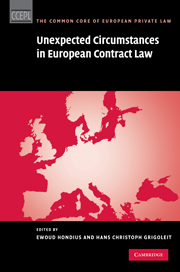Book contents
- Frontmatter
- Contents
- List of contributors
- Books in the series
- General editors' preface
- Preface
- List of abbreviations
- Part I Introduction and context
- Part II Overview
- 4 Overview: concepts dealing with unexpected circumstances
- Part III The case studies
- Part IV General comparative remarks
- Appendix: Some Texts on Change of Circumstances
- Selected bibliography
- Index
- References
4 - Overview: concepts dealing with unexpected circumstances
Published online by Cambridge University Press: 04 April 2011
- Frontmatter
- Contents
- List of contributors
- Books in the series
- General editors' preface
- Preface
- List of abbreviations
- Part I Introduction and context
- Part II Overview
- 4 Overview: concepts dealing with unexpected circumstances
- Part III The case studies
- Part IV General comparative remarks
- Appendix: Some Texts on Change of Circumstances
- Selected bibliography
- Index
- References
Summary
GERMANY AND RELATED JURISDICTIONS
Germany
Introduction
Under German law the most prominent, general and important concept dealing with the effects of unexpected circumstances on the contract is the doctrine of Störung der Geschäftsgrundlage. This principle can roughly be described as an equitable relief that allows the courts to adapt or terminate a contract if the factual framework diverges fundamentally from the parties' expectations. The doctrine of Störung der Geschäftsgrundlage has been developed as a mechanism to define the limits of acceptable risk distribution by contractual stipulations. There are several other rules of a statutory or contractual nature dealing more specifically with the allocation of unexpected risks involved in a deal. It is widely accepted that the concept of Störung der Geschäftsgrundlage has a subsidiary character, i.e., it does not apply if the risk in question is provided for by either contractual or statutory provisions. The scope of the concept of Störung der Geschäftsgrundlage therefore depends on the application of those other legal rules.
Legal doctrines bordering the concept of Störung der Geschäftsgrundlage
The rules of mistake (§§119 et seq. BGB)
Three characteristics of the German law of mistake have a decisive influence on the scope of application of the doctrine of Störung der Geschäftsgrundlage. First, only certain kinds of errors are relevant, second, the consequence of a relevant mistake is only the avoidance of the contract, and, third, the party avoiding the contract may be liable for damages even if the mistake is mutual.
- Type
- Chapter
- Information
- Unexpected Circumstances in European Contract Law , pp. 55 - 172Publisher: Cambridge University PressPrint publication year: 2011
References
- 1
- Cited by



